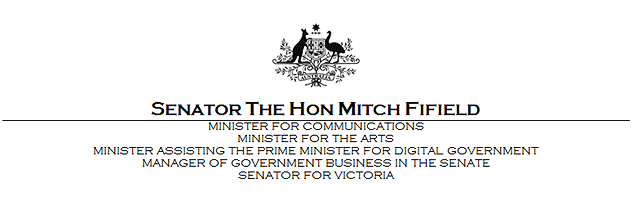nbn three year rollout announcement
Parliament House, Canberra
16 October 2015
7:50 am
E & OE
Subjects: nbn three year rollout plan, ISIL, online security
FIFIELD:
Today nbn is announcing its three-year construction forecast which will deliver 7.5 million premises over the next three years. That’s in addition to the 1.3 million premises that currently have access and the 700,000 that are in construction. So by the end of September 2018 there will be about 9.5 million premises which will either have access or work will be under construction.
JOURNALIST:
And what does this access mean for the everyday person?
FIFIELD:
What it means for the everyday person is that they can have fast broadband. Under the model that this Government is pursuing people will get nationwide access to fast broadband six to eight years earlier than they would under the approach of Stephen Conroy and the Labor Party. So they’ll get it sooner and it will also be cheaper. Our proposition will be about 20 to 30 billion dollars less cost than under the Labor Party.
JOURNALIST:
So how is it being made possible that it is being rolled out quicker than Labor’s plans originally?
FIFIELD:
Well we don’t have a focus on a single technology which is what Labor had with fibre to the premises. We’re pursuing a multi-technology mix approach which means the nbn has the capacity to pick the technology that can deploy the nbn fastest and at lowest cost to people’s premises. That’s great news and with this three year rollout plan for the first time we will have HFC, the TV cables, as part of the rollout plan. And using that HFC, which Labor weren’t, is one of the reasons why we can roll the nbn out much faster.
JOURNALIST:
Yesterday when I spoke with Greg Moriarty, he was talking about ISIL and the way that they’re using online to attract especially younger people now. What exactly is the Government doing when it comes to working with social networks and the online world to try and curb this threat?
FIFIELD:
The Prime Minister met yesterday with security agency chiefs, both Commonwealth and State, to look at the full range of things that the law enforcement agencies and communities can do together to combat avenues of radicalisation. And obviously the way that social media and the internet is used is one of those areas that is being looked at.
JOURNALIST:
And just quickly, there’s discussion this morning that the control order should be brought down to the age of 12. The Government appears open to that, according to Justice Minister Michael Keenan. Is that something that you understand to be the case?
FIFIELD:
I think it’s important to rely on the advice of security agencies and officials. I know that’s what the Prime Minister, the Attorney General and Justice Minister Keenan are doing.
JOURNALIST:
Thank you.
[ends]
Media contact:
Evan Mulholland | 0405 140 780 | Evan.mulholland@communications.gov.au

